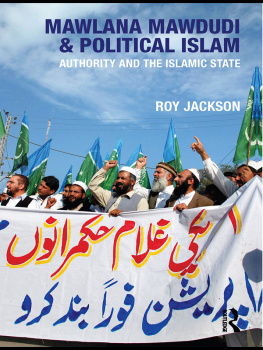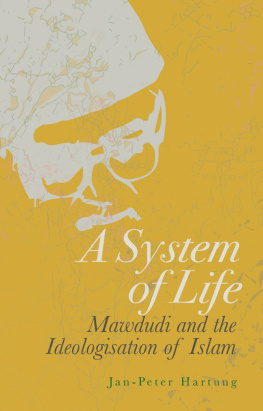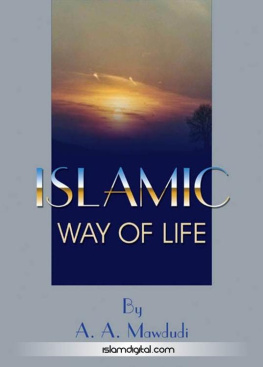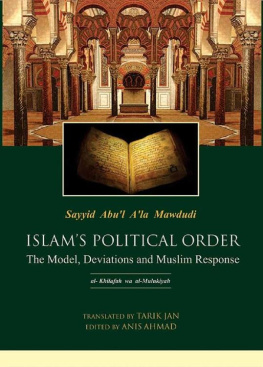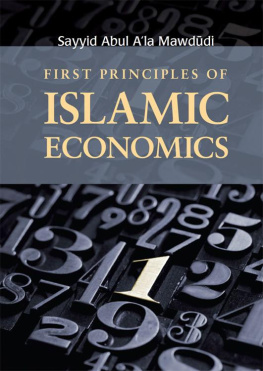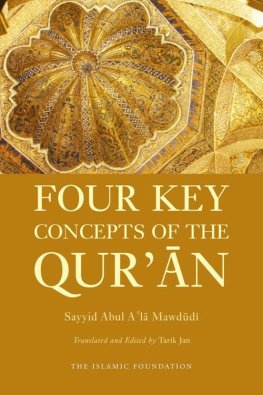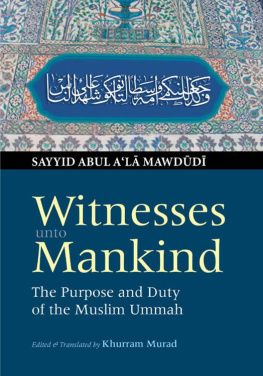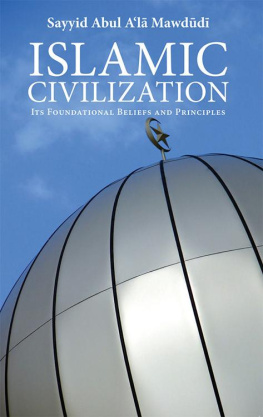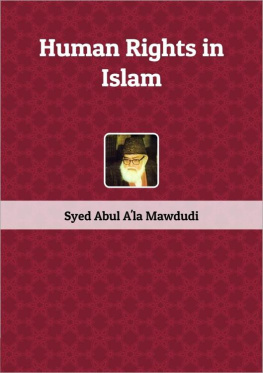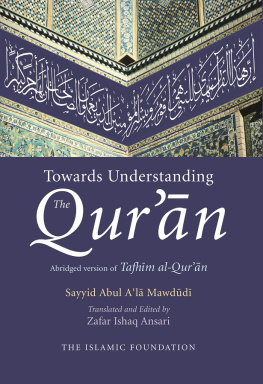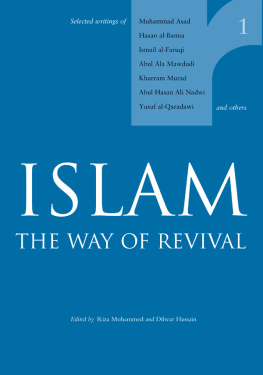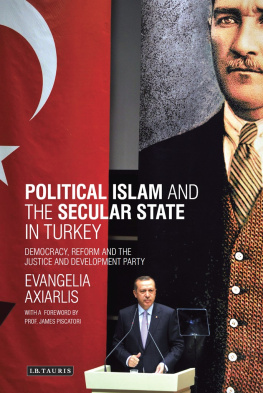Mawlana Mawdudi and Political Islam
Mawlana Mawdudi was one of the most influential and important Islamic thinkers of the modern world, whose brand of political Islam has won wide-spread acceptance in South and South-East Asia as well as the Middle East. He was not only an Islamic scholar, but also a journalist and political activist who founded the Jamaat-i-Islami, which has subsequently influenced the development of many Islamic movements and parties throughout the Muslim world.
This book is the first to engage critically and assess his career and legacy within the wider context of political Islam. It includes coverage of his early life and influences, and examines his considerable influence in the contemporary Islamic world. The issues that were a concern for Mawdudi and continue to have resonance for our world today include such questions as the role of women in Islam; the possibilities for democracy in an Islamic state; the importance of jihad; and the moral and religious responsibility of the individual. While focus is on Mawdudis life and writings, this is placed within the wider context of topical, often contentious, Islamic thought.
Providing an up-to-date and detailed critical study of Mawlana Mawdudi and many issues surrounding political Islam both in Mawdudis time and today, this book will be an important text for scholars of Islamic studies, political science and philosophy.
Roy Jackson is Senior Lecturer in Religion, Philosophy and Ethics at the University of Gloucestershire, with a research interest in the interaction between religion, ethics and philosophy, and with particular emphasis on Islam. He is the author of Fifty Key Figures in Islam (2006) and Nietzsche and Islam (2007), both published by Routledge.
Mawlana Mawdudi and Political Islam
Authority and the Islamic state
Roy Jackson

LONDON AND NEW YORK
First published 2011 by Routledge
2 Park Square, Milton Park, Abingdon, Oxon OX14 4RN
Simultaneously published in the USA and Canada
by Routledge
270 Madison Ave, New York, NY 10016
Routledge is an imprint of the Taylor & Francis Group, an informa business
This edition published in the Taylor & Francis e-Library, 2010.
To purchase your own copy of this or any of Taylor & Francis or Routledges collection of thousands of eBooks please go to www.eBookstore.tandf.co.uk.
2011 Roy Jackson
All rights reserved. No part of this book may be reprinted or reproduced or
utilized in any form or by any electronic, mechanical, or other means, now
known or hereafter invented, including photocopying and recording, or in
any information storage or retrieval system, without permission in writing
from the publishers.
British Library Cataloguing in Publication Data
A catalogue record for this book is available from the British Library
Library of Congress Cataloging in Publication Data
Jackson, Roy, 1962
Mawlana Mawdudi and political Islam : authority and the Islamic state /
Roy Jackson.
p. cm.
Includes bibliographical references and index.
1. Maudoodi, Syed Abul Ala, 190379. 2. Maudoodi, Syed Abul Ala,
190379Political and social views. 3. Muslim scholarsIndiaBiography.
4. Muslim scholarsPakistanBiography. 5. SalafiyyahHistory. I. Title.
BP80.M34J33 2011
297.272092dc22 2010005363
ISBN 0-203-84872-1 Master e-book ISBN
ISBN: 978-0-415-47411-5 (hbk)
ISBN: 978-0-415-47412-2 (pbk)
ISBN: 978-0-203-84872-2 (ebk)
To Raef and Nadiya
Contents
Acknowledgements
Much of the section on women in appeared originally as a chapter entitled Mawdudi, Purdah and the Status of Woman, written by the author and published in Islam and the Veil, ed. Theodore Gabriel (Continuum, 2010).
Introduction
Sayyid Abul Ala Mawdudi (190379) needs no introduction for anyone from South Asia. In fact, in the Muslim intellectual world as a whole, his name is frequently mentioned in debates, conferences and Internet listservs on topics such as Islamic revivalism, democracy, sharia, gender, non-Muslims and jihad. What is often surprising is that, despite his notoriety, he is often misquoted and misunderstood, with views and quotes wrongly or misleadingly attributed to him. The result is that Mawdudi is sometimes presented as one of two extremes: either as more liberal than he actually was, or more traditionalist than, at least, he intended or wished to be. The life and character of Mawdudi is a complex one, tied up as it is with the immense political upheavals that surrounded him at that time, together with the accompanying concerns and debates over Islamic identity, if not the very survival of Islam in the region. To this extent, Mawdudis life and thought can be seen as something of a template that has been repeated across the Islamic world to the present day, hence his name continues to echo loudly.
Mawdudi was many things to many people and, as someone who seems to have rarely taken a moment out to simply reflect and relax, he would approach the world with a kind of vigour and intensity (not always wisely directed, it has to be admitted) that puts most of us to shame. Born in Aurangabad in India, he was a journalist, an Islamic scholar, a Muslim revivalist and a political philosopher. Along with the poet and activist Muhammad Iqbal and the statesman Muhammad Ali Jinnah, Mawdudi is considered at the forefront of the establishment of Pakistan. He is probably most renowned as the founder of Jamaat-e-Islami (the Islamic Party) which continues to be active in Pakistan to this day, as well as its sister organizations in India, Bangladesh, Kashmir and Sri Lanka. Founded in 1941, it is much more than simply a religious or political party; rather it is an Islamic movement, a complete way of life, with an ultimate vision of an Islamic statement founded upon the principles elicited by Mawdudi in his writings and speeches. In its methods, ideology and organization, the Jamaat has proven to be an inspiration and model for many other Islamic groups across the world.
The appeal of Mawdudi resides not only in the Islamic world, however, for here is a man who though perhaps he was reluctant to admit it was influenced by non-Muslim, western thought (as much as he was Islamic thinkers) including Plato, Hegel, Bergson and Marx. This resulted in an interest that is prevalent in much of his writings: placing modern western thought within an Islamic world-view. The importance of Mawdudis thoughts here, particularly his concept of theo-democracy, are crucial in understanding such modern clash of civilizations debates. Mawdudis personality in many ways represents this identity struggle between the values of the west and those of Islam and, ultimately, whether such values are as diverse as people might suppose.
Because of the continued importance of Mawdudi, it is extremely difficult to outline his influence without being painfully aware of what is being left out. Certainly, the Egyptian salafis (revivalists) Hassan al-Banna (founder of the Muslim Brotherhood) and Sayyid Qutb read and were influenced by him. Qutb, the intellectual driving force behind the Muslim Brotherhood and arguably the most significant influence on the more militant Islamic groups that have sprouted, was inspired by Mawdudis writings on the need for an Islamic vanguard. The Palestinian scholar Abdullah Yusuf Azzam was also influenced by Mawdudi and, in turn, Azzam taught a young student named Osama bin Laden. Mawdudis influence can also be found within Shia Islam, notably Ayatollah Ruhollah Khomeini who translated some of his works into Farsi and found the concept of theo-democracy (which, in practical terms, is really a theocracy), fitting for Shia political thought.

